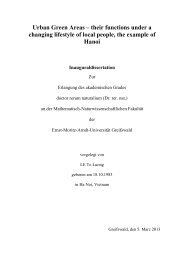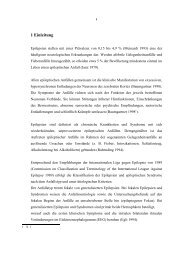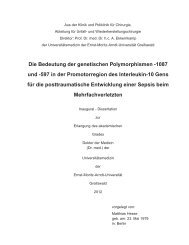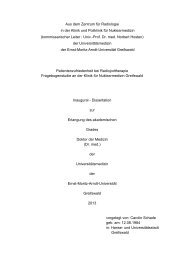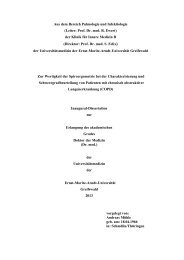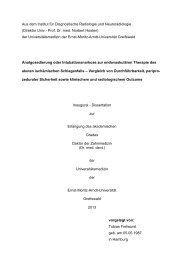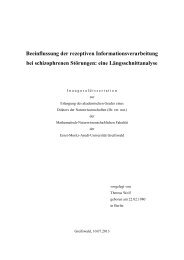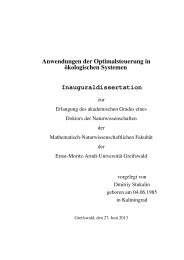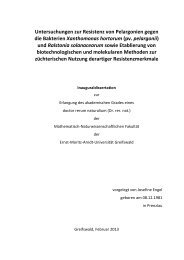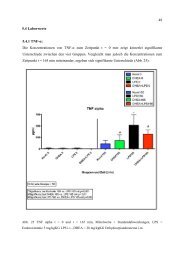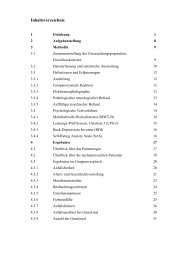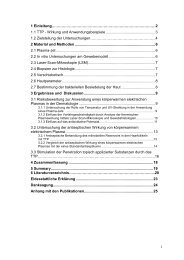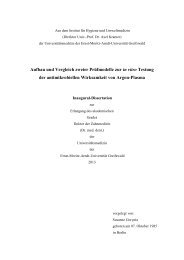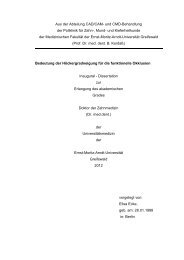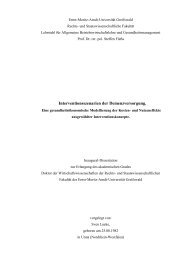genomewide characterization of host-pathogen interactions by ...
genomewide characterization of host-pathogen interactions by ...
genomewide characterization of host-pathogen interactions by ...
Create successful ePaper yourself
Turn your PDF publications into a flip-book with our unique Google optimized e-Paper software.
Maren Depke<br />
Introduction<br />
with heightened release <strong>of</strong> glucocorticoids. Prolonged and increased release <strong>of</strong> catecholamines is<br />
associated with cardiovascular diseases such as hypertension, myocardial infarction, or stroke.<br />
Excessive secretion <strong>of</strong> glucocorticoids was linked to diabetes, dyslipidemia, cardiovascular<br />
alterations, immunosuppression, and mood disorders (Lundberg 2005, McEwen 2004,<br />
Viswanathan/Dhabhar 2005, Wrona 2006).<br />
Recently, Kiank et al. described that BALB/c mice developed severe systemic immune<br />
suppression, neuroendocrinological disturbances and depression-like behavior due to 4.5 days <strong>of</strong><br />
intermittent combined acoustic and restraint stress which serves as a murine model <strong>of</strong> severe,<br />
chronic psychological stress (Kiank et al. 2006, 2007a). Immunosuppression was substantiated <strong>by</strong><br />
a heightened anti-inflammatory cytokine bias, an apoptotic loss <strong>of</strong> lymphocytes leading to<br />
lymphocytopenia, T cell anergy, and impaired phagocytic and oxidative burst responses. The<br />
immunodeficient state increased the animals’ susceptibility to experimental infection with E. coli<br />
(Kiank et al. 2006, 2007b). Repeatedly stressed mice actually developed spontaneous bacterial<br />
infiltrations into the lung measurable even 7 days after the last chronic stress cycle, which was<br />
associated with a reduced inducibility <strong>of</strong> IFN-γ, a cytokine that was shown to be important to<br />
prevent spreading <strong>of</strong> translocated commensals from the gut (Kiank et al. 2008). On the one hand,<br />
stress-induced immunosuppression was accompanied with a reduced clearance <strong>of</strong> experimental<br />
infections in the long term, but on the other hand, with attenuation <strong>of</strong> a hyperinflammatory<br />
septic shock (Kiank et al. 2006, 2007a). Furthermore, behavioral alterations with increased<br />
depression-like behavior and neuroendocrine alterations such as prolonged activation <strong>of</strong> the HPA<br />
axis and increased turnover <strong>of</strong> catecholamines were documented.<br />
Finally, a prominent stress-induced loss <strong>of</strong> body mass without significant changes <strong>of</strong> food and<br />
water intake during the observation period became detectable (Kiank et al. 2006). It is known<br />
that stress exposure is linked to changes <strong>of</strong> body weight. There is evidence that hypothalamic<br />
control <strong>of</strong> food intake is influenced <strong>by</strong> stress, which in consequence alters metabolism. In such a<br />
situation, some people lose and others gain weight in response. However, the molecular<br />
mechanisms <strong>of</strong> the stress to body weight connection remain to be elucidated.<br />
It is important for the understanding <strong>of</strong> stress-induced immunoregulatory mechanisms that<br />
stress hormones like catecholamines and glucocorticoids can modulate several liver functions<br />
including carbohydrate, protein and lipid metabolism or affect the immune response. Especially<br />
corticosteroids can suppress inflammatory processes <strong>by</strong> preventing the release <strong>of</strong><br />
proinflammatory mediators, <strong>by</strong> diminishing immune cell trafficking, phagocytosis and radical<br />
production or <strong>by</strong> down-regulating antigen presentation, <strong>by</strong> inhibiting lymphocyte proliferation,<br />
and <strong>by</strong> inducing apoptosis <strong>of</strong> immune cells. Thus, prolonged increase <strong>of</strong> glucocorticoid levels<br />
during chronic stress can activate hepatic catabolic pathways but also effectively suppress the<br />
local immune response (Bartolomucci 2007, Chida et al. 2006, Elenkov 2004, Swain 2000).<br />
19



